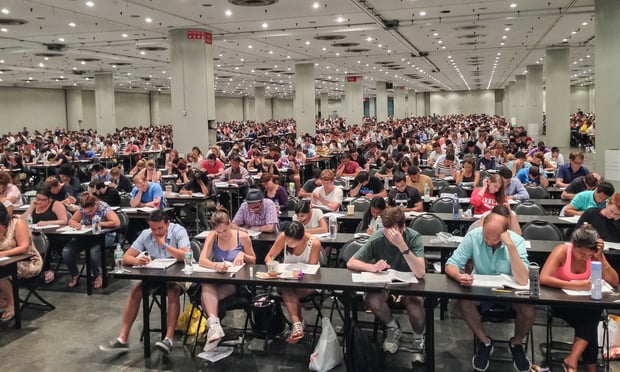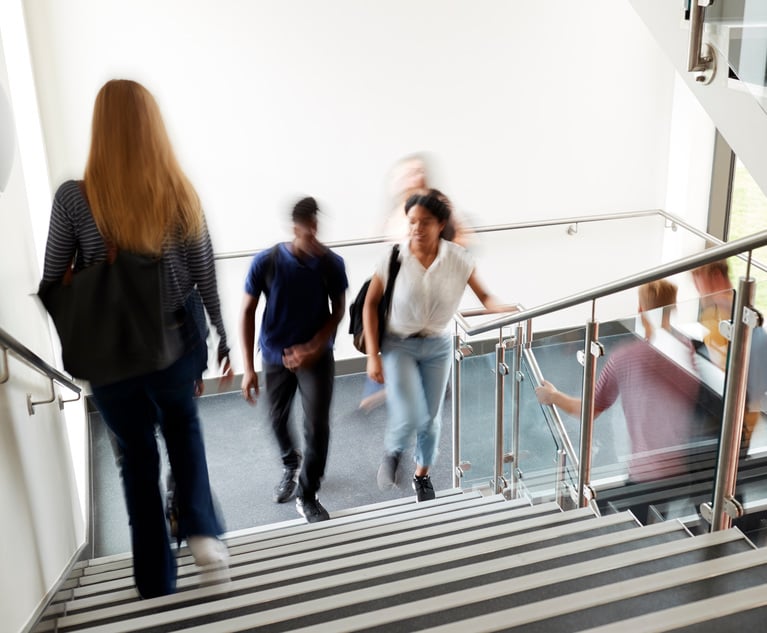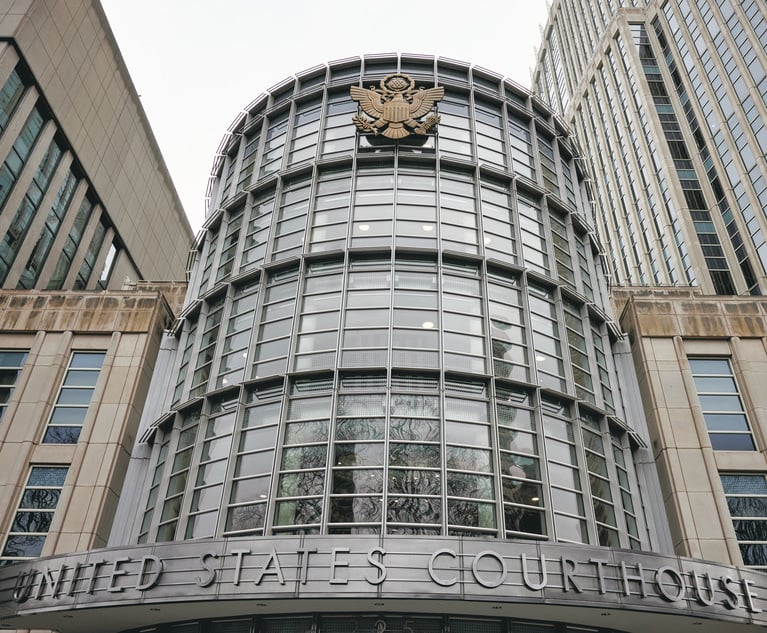Fall Bar Exam Gets Pushback From NY Law Deans
The deans of the state's 15 ABA-accredited law schools have asked the court to adopt an 18-month supervised practice program as an alternative to a postponed July bar exam, allowing 2020 law grads to practice without passing the test.
April 02, 2020 at 02:36 PM
4 minute read
 Students taking mock bar exam in New York in 2017.
Students taking mock bar exam in New York in 2017.
Law deans in New York are pushing back against the plan to reschedule the July bar exam for early September in light of the COVID-19 pandemic, citing concerns that the exam may not be possible for public health reasons and that any delay in licensing new lawyers will harm graduating law students.
An April 1 letter to Chief Judge Janet DiFiore of the New York State Court of Appeals signed by the deans of all 15 of the state's American Bar Association-accredited law schools urges the court to adopt a system whereby 2020 law graduates would be able to practice for up to 18 months under the supervision of a licensed attorney.
The deans say this plan would allow graduates to work in legal settings until they can take either the February or July bar exam in 2021. Moreover, the deans urge the court to consider allowing those graduates to forgo the bar exam altogether after working successfully for months with an experienced lawyer. They also said the court should seriously weigh an online bar exam.
"Even if a date for a September examination is set quickly, the unpredictable public health situation means that our graduates will still lack the certainty needed to structure their lives and finances," the deans' letter reads. "This uncertainty will particularly disadvantage graduates who already would have struggled to piece together financing to bridge the time between graduation, taking the exam, and starting work—even if the exam had been administered in July."
Lucian Chalfan, public information officer for the New York court system, said Thursday that DiFiore had received the deans' letter and would be "responding accordingly."
New York on March 27 became the first jurisdiction to announce that it would not hold the bar exam in July—a decision rendered by the Court of Appeals. It followed up March 31 with a statement that it will seek to administer the bar exam in "early September." (The National Conference of Bar Examiners, which develops the test, has said it will offer a fall bar exam for jurisdictions that cannot or choose not to move forward with the July test, but it has not yet announced a date for that administration.)
The Court of Appeals, in its latest public statement on the exam, acknowledged the uncertainty surrounding the ability to administer the bar in September and said it's considering a temporary expansion of an existing program that enables law students and graduates awaiting bar exam results to practice under attorney supervision. That existing program is limited to government and legal aid settings currently, but the court is considering expanding it to include private sector settings.
The law deans would like to see a more expansive supervised practice system implemented. Under their proposal, which would be temporary, graduates would be able to practice under the watch of a licensed attorney for 18 months, starting from the date of graduation. They could then take the February or July bar exam in 2021, and if they failed, their provisional admission would be rescinded. They also urged the court to consider going even further and allowing law graduates who have successfully completed that 18-month provisional to skip the exam.
"In light of the challenges of preparing for the bar examination while holding down a full-time job, we believe the court should consider allowing members of the class of 2020 who successfully complete a period of supervised practice to seek admission to the bar without sitting for the bar examination," their letter reads.
That proposal offers a twist on the temporary diploma privilege option that many graduating law students are lobbying courts and attorney licensing entities to adopt. Under that system, graduates of ABA-accredited law schools would be admitted to the bar without taking the bar and without practicing under the supervision of an experienced attorney.
The deans commended the New York court for taking swift action on the July bar exam matter, noting that other jurisdictions are likely to follow the state's lead.
"We urge the court to take a further step in this direction, protecting the members of our profession and the communities they serve by adopting an alternative route to bar admission when client need is most urgent and circumstances most precarious," they wrote.
This content has been archived. It is available through our partners, LexisNexis® and Bloomberg Law.
To view this content, please continue to their sites.
Not a Lexis Subscriber?
Subscribe Now
Not a Bloomberg Law Subscriber?
Subscribe Now
NOT FOR REPRINT
© 2025 ALM Global, LLC, All Rights Reserved. Request academic re-use from www.copyright.com. All other uses, submit a request to [email protected]. For more information visit Asset & Logo Licensing.
You Might Like
View All
The Met Hires GC of Elite University as Next Legal Chief

NY Appellate Panel Cites Student's Disciplinary History While Sending Negligence Claim Against School District to Trial

'No Evidence'?: Big Law Firms Defend Academic Publishers in EDNY Antitrust Case
3 minute read
'Substantive Deficiencies': Judge Grants Big Law Motion Dismissing Ivy League Price-Fixing Claims
3 minute readTrending Stories
- 1Settlement Allows Spouses of U.S. Citizens to Reopen Removal Proceedings
- 2CFPB Resolves Flurry of Enforcement Actions in Biden's Final Week
- 3Judge Orders SoCal Edison to Preserve Evidence Relating to Los Angeles Wildfires
- 4Legal Community Luminaries Honored at New York State Bar Association’s Annual Meeting
- 5The Week in Data Jan. 21: A Look at Legal Industry Trends by the Numbers
Who Got The Work
J. Brugh Lower of Gibbons has entered an appearance for industrial equipment supplier Devco Corporation in a pending trademark infringement lawsuit. The suit, accusing the defendant of selling knock-off Graco products, was filed Dec. 18 in New Jersey District Court by Rivkin Radler on behalf of Graco Inc. and Graco Minnesota. The case, assigned to U.S. District Judge Zahid N. Quraishi, is 3:24-cv-11294, Graco Inc. et al v. Devco Corporation.
Who Got The Work
Rebecca Maller-Stein and Kent A. Yalowitz of Arnold & Porter Kaye Scholer have entered their appearances for Hanaco Venture Capital and its executives, Lior Prosor and David Frankel, in a pending securities lawsuit. The action, filed on Dec. 24 in New York Southern District Court by Zell, Aron & Co. on behalf of Goldeneye Advisors, accuses the defendants of negligently and fraudulently managing the plaintiff's $1 million investment. The case, assigned to U.S. District Judge Vernon S. Broderick, is 1:24-cv-09918, Goldeneye Advisors, LLC v. Hanaco Venture Capital, Ltd. et al.
Who Got The Work
Attorneys from A&O Shearman has stepped in as defense counsel for Toronto-Dominion Bank and other defendants in a pending securities class action. The suit, filed Dec. 11 in New York Southern District Court by Bleichmar Fonti & Auld, accuses the defendants of concealing the bank's 'pervasive' deficiencies in regards to its compliance with the Bank Secrecy Act and the quality of its anti-money laundering controls. The case, assigned to U.S. District Judge Arun Subramanian, is 1:24-cv-09445, Gonzalez v. The Toronto-Dominion Bank et al.
Who Got The Work
Crown Castle International, a Pennsylvania company providing shared communications infrastructure, has turned to Luke D. Wolf of Gordon Rees Scully Mansukhani to fend off a pending breach-of-contract lawsuit. The court action, filed Nov. 25 in Michigan Eastern District Court by Hooper Hathaway PC on behalf of The Town Residences LLC, accuses Crown Castle of failing to transfer approximately $30,000 in utility payments from T-Mobile in breach of a roof-top lease and assignment agreement. The case, assigned to U.S. District Judge Susan K. Declercq, is 2:24-cv-13131, The Town Residences LLC v. T-Mobile US, Inc. et al.
Who Got The Work
Wilfred P. Coronato and Daniel M. Schwartz of McCarter & English have stepped in as defense counsel to Electrolux Home Products Inc. in a pending product liability lawsuit. The court action, filed Nov. 26 in New York Eastern District Court by Poulos Lopiccolo PC and Nagel Rice LLP on behalf of David Stern, alleges that the defendant's refrigerators’ drawers and shelving repeatedly break and fall apart within months after purchase. The case, assigned to U.S. District Judge Joan M. Azrack, is 2:24-cv-08204, Stern v. Electrolux Home Products, Inc.
Featured Firms
Law Offices of Gary Martin Hays & Associates, P.C.
(470) 294-1674
Law Offices of Mark E. Salomone
(857) 444-6468
Smith & Hassler
(713) 739-1250






